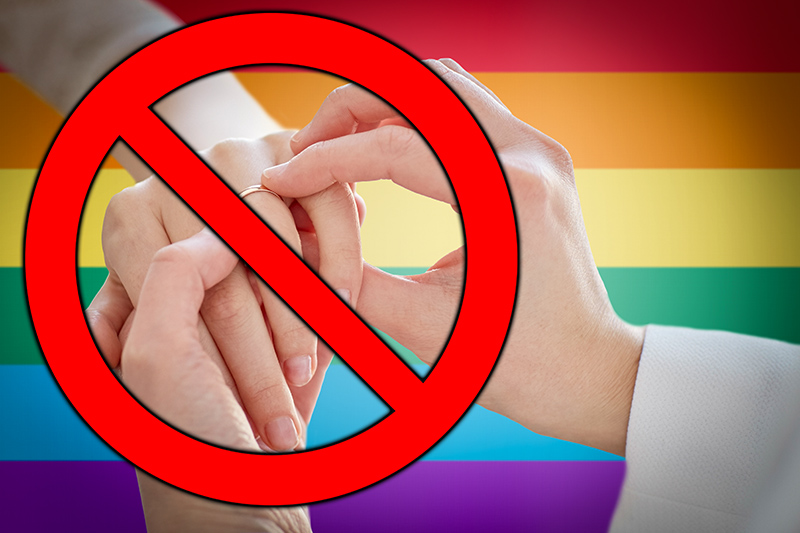California Republicans Reject Platform Change on Gay Marriage
Delegates at the California Republican Party state convention rejected a proposed language to "soften" the party's platform on social issues.

The California Republican Party rejected a proposed change to its official platform that would have softened the state party’s stances on same-sex marriage and abortion in an attempt to appeal to a wider swath of voters in the liberal-leaning state.
The proposed platform change would have eliminated the party’s definition of marriage as a union between “one man and one woman” and would have revised the platform’s “right to life” section to say the party wishes to see “the number of abortions reduced,” rather than a complete ban on the practice.
The proposed “softer” language around social issues was defeated by delegates at the California GOP’s annual state convention in Anaheim last weekend, with more conservative elements pushing for more stringent, harsher language emphasizing absolute opposition to same-sex marriage and abortion, reports the Sacramento Bee.
Proponents of the change, such as California GOP Treasurer Greg Gandrud, said the party needs to be more inclusive, not only of LGBTQ people, but voters who don’t naturally adhere to or align with hardline conservative views on social issues, if it wants to start winning statewide elections in a state where the Republican Party, as a whole, has been largely relegated to the political sidelines.
“We just should be welcoming and make sure everybody knows they’re welcome in the Republican Party,” Gandrud argued, appearing to imply that some voters may be more aligned with the party on economic issues. “We have solutions to the things that people really care most about.”
But social conservatives argued that watering down the language of the platform would simply cause the party to lose the support of its most fervent base voters, arguing that being seen as compromising on social issues would be interpreted as a betrayal of the party’s core values.
Randall Jordan, the California GOP Central Coast vice chair, told a regional meeting at the state convention that the party should not be seen as embracing LGBTQ members at a time when Republicans — not only in California, but nationwide — are fighting for “parental rights” in schools.
For example, the party has touted the idea that school personnel should inform parents when their child has decided to identify as LGBTQ or as a gender that does not align with their assigned sex at birth. Republicans have also demanded greater parental influence over the types of books available in school libraries and the types of lessons that their children are being taught.
Jordan, who also serves as the chair of the San Luis Obispo County Republican Party, argued that supporters of same-sex marriage were breaking a promise made back in 2015 when the state party recognized the gay group Log Cabin Republicans as a chartered group. According to Jordan, those who pushed for the group’s acceptance had promised, at the time, not to attempt to change the party’s definition of marriage.
“I think we have lost so many people in our party that were true Republicans,” Jordan argued. “As soon as we started losing our values, and we started being the big tent, I think they left us. They either left the state or they left our party, and now they’re no party preference.”
Similar proposals to adopt state party platforms with less severe language on LGBTQ issues have failed in other states. In June 2022, Texas Republicans pushed through platform language — over the objections of a significant number of delegates — calling homosexuality as an “abnormal lifestyle choice” and refusing to recognize transgender identity among adults as valid.
But Charles Moran, the president of Log Cabin Republicans, which lobbied for the proposed language change, worried that holding firm on some stances will make it harder for the party’s own candidates for office to campaign in larger cities, for example.
“What I worry about is our Assembly and our state Senate candidates who now have to take this flawed, outdated platform that’s 20 years old and have to sell that to the voters in places like South Central or Watts or Hillcrest or the Castro,” Moran said. “They’re going to be woefully ill-equipped because this group of people decided to make choices about what conservatism means in the state of California. And it takes away the ability of candidates to do that.”
Support Metro Weekly’s Journalism
These are challenging times for news organizations. And yet it’s crucial we stay active and provide vital resources and information to both our local readers and the world. So won’t you please take a moment and consider supporting Metro Weekly with a membership? For as little as $5 a month, you can help ensure Metro Weekly magazine and MetroWeekly.com remain free, viable resources as we provide the best, most diverse, culturally-resonant LGBTQ coverage in both the D.C. region and around the world. Memberships come with exclusive perks and discounts, your own personal digital delivery of each week’s magazine (and an archive), access to our Member's Lounge when it launches this fall, and exclusive members-only items like Metro Weekly Membership Mugs and Tote Bags! Check out all our membership levels here and please join us today!

























You must be logged in to post a comment.